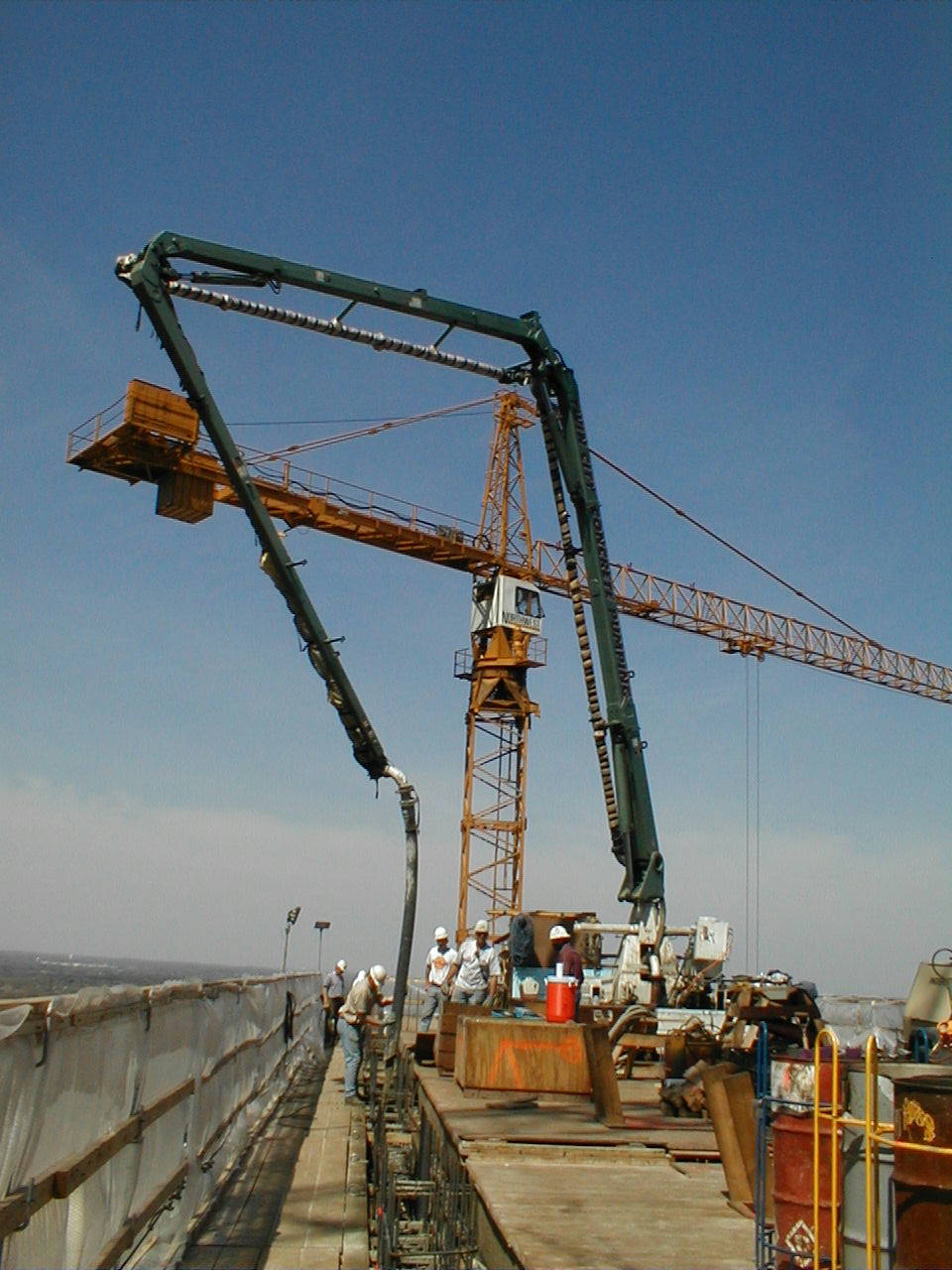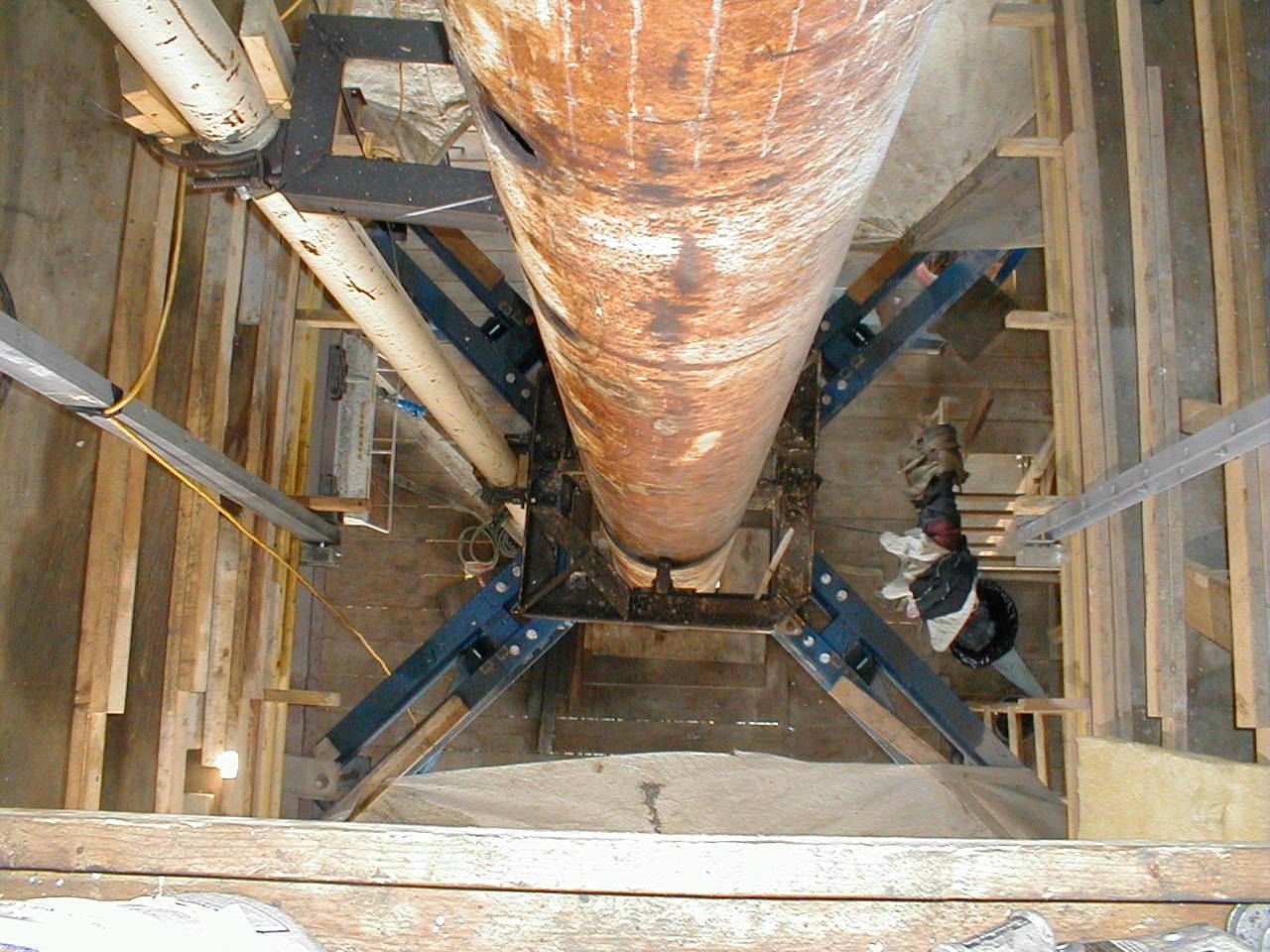Placing Boom Rides Formwork to Pour 9,000-Yd Highrise Core

A specialized self-climbing concrete forming system, designed to work in tandem with a separate placing boom and concrete pump, is speeding construction of the core walls for a mid-sized office tower in downtown Minneapolis.
The form’s custom design minimizes intermediate rework and adjustments throughout the pouring sequence for the project’s general contractor M.A. Mortenson, Minneapolis. It was chosen to hasten the placement of 9,000 cu yds in the core.
The 50 South Sixth Street Tower, developed by Hines Corp. Houston, and designed by Houston architects Kendall Heaton Associates, is a 32-story structure that will rise 420 ft. It will contain over one-million sq ft of parking, retail and office space. The project calls for 38,000 cu yds of concrete.
Boom pumps start project
Mortenson started the job in June 1999, with a 30-ft-deep excavation measuring 150×270 ft, and shored with tie-backs. An overnight pour in October of 3,700 cu yds for a 9-ft-thick base mat was made by a trio of Schwing truck-mounted boom pumps brought in by Twin Cities Concrete Pumping Co.
Two 47-meter pumps were positioned at street grade, while a 45-meter unit worked from excavated grade deep in the hole. The pour was started at 8:00 p.m. and completed by 6:00 a.m., as the mat and core footings were done at an average 123 cu yds/hr per pump.
The first 8 floors of the building are all concrete, before steel framing takes over at Level 9 to the top. While columns are bucketed, the two Schwing 47s pour lower-level decks. Making individual pours of 250 to 400 cu yds, an average of four pours completes a full deck, says Mortenson’s Scott Amundson, project engineer.
“Our biggest problem is the size of the project versus the size of the property,” says Amundson. “The boom pumps work from just one lane of the street, and we’ve got zero laydown area – absolutely no space to stockpile materials.”
The post-tensioned 8-in.-thick suspended decks are shaped with flying table forms. Deck pours are made every third day as the pumps average 100 yds/hr and frequently hit 120 yds/hr, Amundson says. The crowded site enables only one ready-mix truck to unload at each pump, and there’s no room for a truck staging area near the project’s 6th Street and Nicollet Mall location in the heart of downtown Minneapolis.
Pumping the core
By early March suspended decks were well under construction. Levels 3 through8 comprise the parking garage, with the space below designed for retail shops. The garage, with the space below designed for retail shops. The garage surrounds the building from core to perimeter.
In the meantime, work on the core had advanced to the 19th floor. A Schwing 28-meter separate placing boom rides the climbing-form system to make one pour a week for the 2-ft-thick exterior walls and 18-in. interior cell walls of the core.
The core’s forming system is supplied by Conesco Industries, Ltd., and manufactured by Doka, an Austrian firm. Its design for this project resulted from Conesco’s collaboration with Schwing and Mortenson specialists to create a form that is tailored to shape the walls and the four cells that comprise the 114×31-ft core. The form uses timber beams and plywood facing. It is custom-fabricated to 14 ft high to accommodate the tower’s interstitial floor spacing.
The exterior wall forms have 23 self-climbers with a lifting capacity of five tons. Interior wall systems have four climbers per cell, each with ten-ton capacities. Combined they are able to push over 4,000 sq ft of formwork to the next level in a single operation in 20 minutes. The system’s support structure is all beneath the actual formwork, eliminating support structure interference common in self-jacking systems.
Since the first four levels of the core walls were poured by the Schwing 47-meter boom pumps, a placing boom support system – similar to that of the formwork system – has been installed. The second cell of the core is fitted with four additional self-climbers to lift and brace the boom. They are installed two floors beneath the working level.
The Schwing KVM 28 placing boom works in unison with the internal self-climbers used to lift the formwork. The boom and its 60-ft mast combine for a total load of 25,000 lbs. Concrete is pumped to the boom from a Schwing 32-meter with a 2023-5 pump kit that “is similar to a Schwing 4000 trailer pump,” according to Twin City Concrete Pumping’s dispatcher Keith Larson. The boom is not used in concrete delivery.
“We’re advancing the core by one floor a week with the separate placing boom,” Amundson says. “There are 33 lifts of 250 yards each. A pour takes about four hours. We’re working around beams and elevator blockouts, and paying close attention to concrete vibration. We could go to a four- or five-day pour cycle to speed things up, but there’s a shortage of ironworkers, and we need them on the decks.”
On schedule for deadline
Concrete is delivered from two Minneapolis plants of Cemstone Products Co. on 15- to 20-minute hauls. Up to 25 trucks are dispatched for deck pours, but no more than three or four can wait at the crowded site.
Core-wall mix starts at 8,000-psi, with 5 percent air entrainment, ?-in. aggregate and 15 to 20 percent flyash. Concrete strength drops to 6,000-psi at Level 12 and will be reduced to 5,000-psi at Level 21. The highest strength mix, at 10,000-psi, is placed from the basement to Level 4 for the tower’s structural elements.
The specialized core-wall forming system, Amundson says, is helping keep the job on schedule to meet its June 2001 deadline. “Measured in formwork square-footage per manhour, we’re getting up to four times the productivity over traditional formwork,” he maintains. “Our workers say it’s ‘idiot-proof.’ It requires only one operator with a remote control once it’s in place.”
When the core is topped out in late spring, Mortenson will reposition the Schwing placing boom to complete the high decks.









